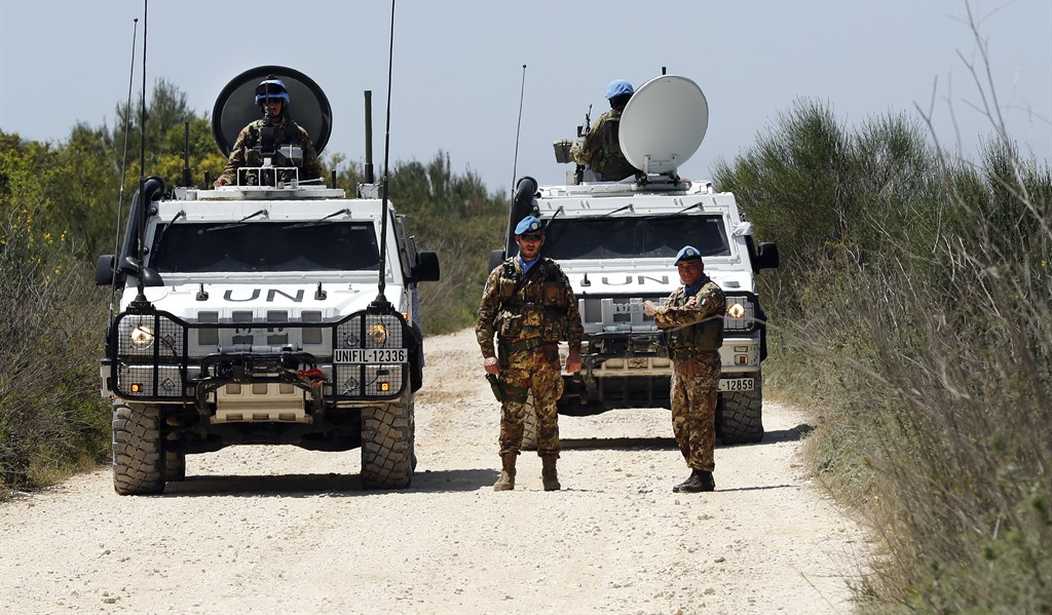The United States contributes annually to the failed UN peacekeeping operation in Lebanon established in 1978 and known as the United Nations Interim Force in Lebanon (UNIFIL). It was originally established due to PLO and Palestinian destabilization efforts in South Lebanon along with regular terror attacks on Israelis across the border. It was further augmented (and funded) in 2006 with a specific mandate to ensure the demilitarization of Hezbollah terrorists and to support efforts of the Lebanese Armed Forces (LAF) against terrorist insurgents, to combat weapons smuggling, and to confirm the withdrawal of Israel Defense Forces (IDF) from Lebanon.
Since UNIFIL’s expanded, and totally attainable mandate in 2006, the United States is its largest funder, to the tune of 26.94 percent of the annual $510 million budget. Since 2006, America has spent more than $2.5 billion to support UNIFIL. The US has also spent a similar amount in support of the Lebanese armed forces (LAF) including weapons systems and training of Lebanese forces. Neither the LAF nor UNIFIL lacks the means or manpower necessary to do its job. They lack the will and they want to keep their US-funded gravy train rolling.
Israel began an active campaign targeting Hezbollah members on September 17 when it launched what some are referring to as Operation Grim Beeper - the simultaneous explosion of thousands of pagers used by Hezbollah’s mid-to senior-rank officers. Ten days later, the IDF targeted and assassinated Hezbollah’s leader Hassan Nasrallah and over the subsequent weeks assassinated both his successor and his successor’s successor. Israel’s operation was amped up following Iran’s direct attack on Israel, the second this year, on October 1 in which Iran launched 180 ballistic missiles into Israel from Iran, the most ever launched in any conflict anywhere. Israel is now more determined than ever to eliminate the threats posed by Hezbollah and to take the fight to its patron, Iran.
Recommended
Meanwhile, back in Lebanon, UNIFIL peacekeepers have seen fit to wake up from their years-long slumber and long afternoons in Beirut cafes to push back. Not to fulfill their mission and demilitarize Hezbollah, rather to push back at the IDF who have put a crimp in their lifestyles. There are currently approximately 10,000 soldiers participating in UNIFIL’s peacekeeping operations in order to demilitarize Hezbollah. Yet in just two weeks, the IDF has discovered dozens of tunnels, some as long as 800 meters and some as deep as hundreds of meters below ground, constructed through mountains and into rocks. There is evidence that Iran and North Korea have helped Hezbollah to construct these underground operations. Yet, UNIFIL saw none of this happening, in broad daylight, over the course of years.
In advance of Israel’s operations in southern Lebanon and in order to avoid collateral damage, the IDF issued warnings to the population that it would be attacking military targets that have been embedded in civilian and population centers. It included UNIFIL in the warning and urged peacekeepers to evacuate. Hezbollah, like its younger brothers in Hamas, use civilians and peacekeepers as human shields. UNIFIL peacekeepers apparently believe that fealty to their masters in Hezbollah is wiser than heeding IDF warnings, and many have stridently refused to evacuate.
Why on earth would UNIFIL refuse to evacuate? Perhaps their reasoning is akin to UNRWA’s reflexive blame-casting onto the IDF. They are complicit in Hezbollah’s activities much as UNRWA is complicit in Hamas’s. Indeed, Hezbollah tunnels have been located in very close proximity to UNIFIL headquarters and other UN buildings in Lebanon. There is no way that UNIFIL officials did not know the tunnels were right next door and that they were chock full of weapons. Acknowledging Hezbollah’s actions and actually honoring their mandate to disarm Hezbollah might end their high-pay/low-pressure jobs for life, so UNIFIL members naturally stood by their partners in duplicity, the Lebanese Armed Forces, and complained about IDF incursions.
Five billion dollars later, what has America’s investment in UNIFIL and the LAF gotten us? A terror force that is armed to the teeth by Iran. An underground operation reinforced naturally by borders and woodlands. A weapons cache that, despite enormous IDF successes at weapons destruction, still includes: over 50,000 mortars capable of short range attacks that can be produced locally in Lebanon with some outside components from Iran, 25,000 rockets capable of 30-80 km range targeting with some manufactured in Lebanon by Hezbollah, and approximately 2,000 rockets capable of hitting targets 80-100 km away, which can be manufactured in Lebanon. Also in Hezbollah’s arsenal are unknown quantities of drones, long-range missiles, anti-tank missiles, and precision-guided missiles.
On top of Hezbollah’s shameless manipulation of civilian populations, Hezbollah functions as a state within a state. It not only has tacit control over UNIFIL such that it keeps the UN agency from doing anything in Lebanon, but it has very real control over the levers of the Lebanese government, including the LAF. Masquerading as a political party as well as a terrorist army, Hezbollah has snookered the Lebanese government into handing over the reins of control because of one underlying emotion: fear. Hezbollah assassinated Prime Minister Rafik Hariri in 2004 and every prime minister since then has spent the bulk of his term looking over his shoulder for potential assassins. This hasn’t exactly led to the formation of stable governments. Without a stable government and Hezbollah effectively running the show, UNIFIL has seen no reason to act on its mandate to disarm the strongmen. Instead, like Lebanon's leaders, UNIFIL goes with the flow, eases into and out of Lebanese high society, and leaves Israel’s northern border vulnerable to terror attacks.
Given the UN’s antagonistic track record vis-a-vis Israel, is it any surprise that Secretary General Antonio Guterres and his minions have never called out UNIFIL’s failures? The reckoning that is now befalling Hezbollah and Lebanon has been decades in coming.
Bonnie Glick is the former Deputy Administrator/Chief Operating Officer of the US Agency for International Development

























Join the conversation as a VIP Member